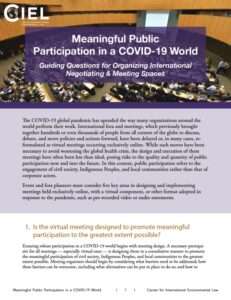
Guiding Questions for Organizing International Negotiating & Meeting Spaces
The COVID-19 pandemic upended long-held plans for international conventions, meetings, and negotiating spaces, forcing critical conversations onto digital platforms that, until March 2020, had never been tested by the global community. While the transition to online platforms was necessary, the design and execution of the reimagined virtual meetings have been less than ideal, posing risks to the quality and quantity of public participation now and into the future.
The transition to virtual platforms has laid bare a hierarchy of participants’ rights that favors businesses, industry groups, and those in the Global North, often to the exclusion of civil society, Indigenous Peoples, and local communities.
As negotiating spaces, conferences, and fora begin to reassemble in the coming months, many will need to take urgent action. These critical discussions benefit from the participation of an active, vibrant civil society. For that to exist, conversations and deliberations must be as inclusive as possible.
Now, as planners design and implement virtual-only or hybrid meetings, they must rethink how to design meaningful public participation going forward to ensure principles of equity, examine the impact of technical decisions on different stakeholders, and ensure the privacy of all participants.
Meaningful Public Participation in a COVID-19 World: Guiding Questions for Organizing International Negotiating & Meeting Spaces showcases best practices and lessons learned from meetings throughout the pandemic. It is designed to be used in advocacy efforts to change inadequate policies and by meeting organizers in their session planning.
Read the full list of guiding questions.
Published on July 29, 2021
